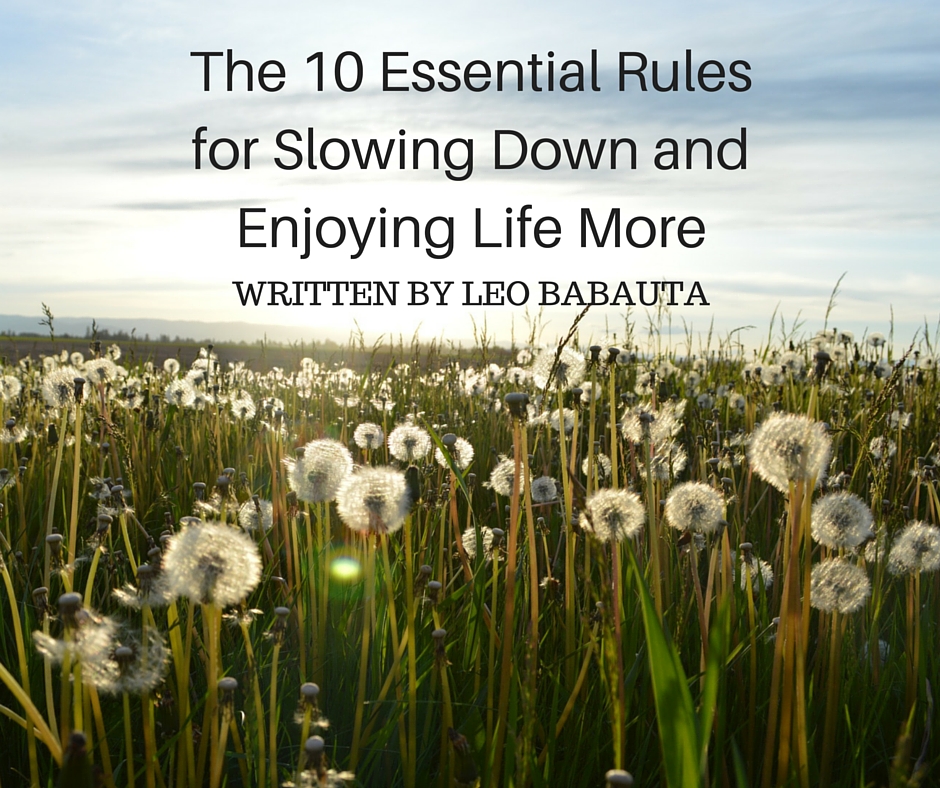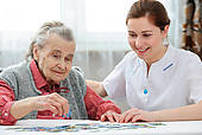
POST WRITTEN BY LEO BABAUTA. FOLLOW ME ON TWITTER.
It’s an irony of our modern lives that while technology is continually invented that saves us time, we use that time to do more and more things, and so our lives are more fast-paced and hectic than ever.
Life moves at such a fast pace that it seems to pass us by before we can really enjoy it.
However, it doesn’t have to be this way. Let’s rebel against a hectic lifestyle and slow down to enjoy life.
A slower-paced life means making time to enjoy your mornings, instead of rushing off to work in a frenzy. It means taking time to enjoy whatever you’re doing, to appreciate the outdoors, to actually focus on whoever you’re talking to or spending time with — instead of always being connected to a Blackberry or iPhone or laptop, instead of always thinking about work tasks and emails. It means single-tasking rather than switching between a multitude of tasks and focusing on none of them.
Slowing down is a conscious choice, and not always an easy one, but it leads to a greater appreciation for life and a greater level of happiness.
Here’s how to do it.
1. Do less. It’s hard to slow down when you are trying to do a million things. Instead, make the conscious choice to do less. Focus on what’s really important, what really needs to be done, and let go of the rest. Put space between tasks and appointments, so you can move through your days at a more leisurely pace. Read more.
2. Be present. It’s not enough to just slow down — you need to actually be mindful of whatever you’re doing at the moment. That means, when you find yourself thinking about something you need to do, or something that’s already happened, or something that might happen … gently bring yourself back to the present moment. Focus on what’s going on right now. On your actions, on your environment, on others around you. This takes practice but is essential.
3. Disconnect. Don’t always be connected. If you carry around an iPhone or Blackberry or other mobile device, shut it off. Better yet, learn to leave it behind when possible. If you work on a computer most of the day, have times when you disconnect so you can focus on other things. Being connected all the time means we’re subject to interruptions, we’re constantly stressed about information coming in, we are at the mercy of the demands of others. It’s hard to slow down when you’re always checking new messages coming in.
4. Focus on people. Too often we spend time with friends and family, or meet with colleagues, and we’re not really there with them. We talk to them but are distracted by devices. We are there, but our minds are on things we need to do. We listen, but we’re really thinking about ourselves and what we want to say. None of us are immune to this, but with conscious effort you can shut off the outside world and just be present with the person you’re with. This means that just a little time spent with your family and friends can go a long way — a much more effective use of your time, by the way. It means we really connect with people rather than just meeting with them.
5. Appreciate nature. Many of us are shut in our homes and offices and cars and trains most of the time, and rarely do we get the chance to go outside. And often even when people are outside, they’re talking on their cell phones. Instead, take the time to go outside and really observe nature, take a deep breath of fresh air, enjoy the serenity of water and greenery. Exercise outdoors when you can, or find other outdoor activities to enjoy such as nature walks, hiking, swimming, etc. Feel the sensations of water and wind and earth against your skin. Try to do this daily — by yourself or with loved ones.
6. Eat slower. Instead of cramming food down our throats as quickly as possible — leading to overeating and a lack of enjoyment of our food — learn to eat slowly. Be mindful of each bite. Appreciate the flavors and textures. Eating slowly has the double benefit of making you fuller on less food and making the food taste better. I suggest learning to eat more real food as well, with some great spices (instead of fat and salt and sugar and frying for flavor).
7. Drive slower. Speedy driving is a pretty prevalent habit in our fast-paced world, but it’s also responsible for a lot of traffic accidents, stress, and wasted fuel. Instead, make it a habit to slow down when you drive. Appreciate your surroundings. Make it a peaceful time to contemplate your life, and the things you’re passing. Driving will be more enjoyable, and much safer. You’ll use less fuel too.
8. Find pleasure in anything. This is related to being present, but taking it a step farther. Whatever you’re doing, be fully present … and also appreciate every aspect of it, and find the enjoyable aspects. For example, when washing dishes, instead of rushing through it as a boring chore to be finished quickly, really feel the sensations of the water, the suds, the dishes. It can really be an enjoyable task if you learn to see it that way. The same applies to other chores — washing the car, sweeping, dusting, laundry — and anything you do, actually. Life can be so much more enjoyable if you learn this simple habit.
9. Single-task. The opposite of multi-tasking. Focus on one thing at a time. When you feel the urge to switch to other tasks, pause, breathe, and pull yourself back. Read more.
10. Breathe. When you find yourself speeding up and stressing out, pause, and take a deep breath. Take a couple more. Really feel the air coming into your body, and feel the stress going out. By fully focusing on each breath, you bring yourself back to the present, and slow yourself down. It’s also nice to take a deep breath or two — do it now and see what I mean. :)
916-225-3570 [email protected] http://www.cjwatterslaw.com


 RSS Feed
RSS Feed